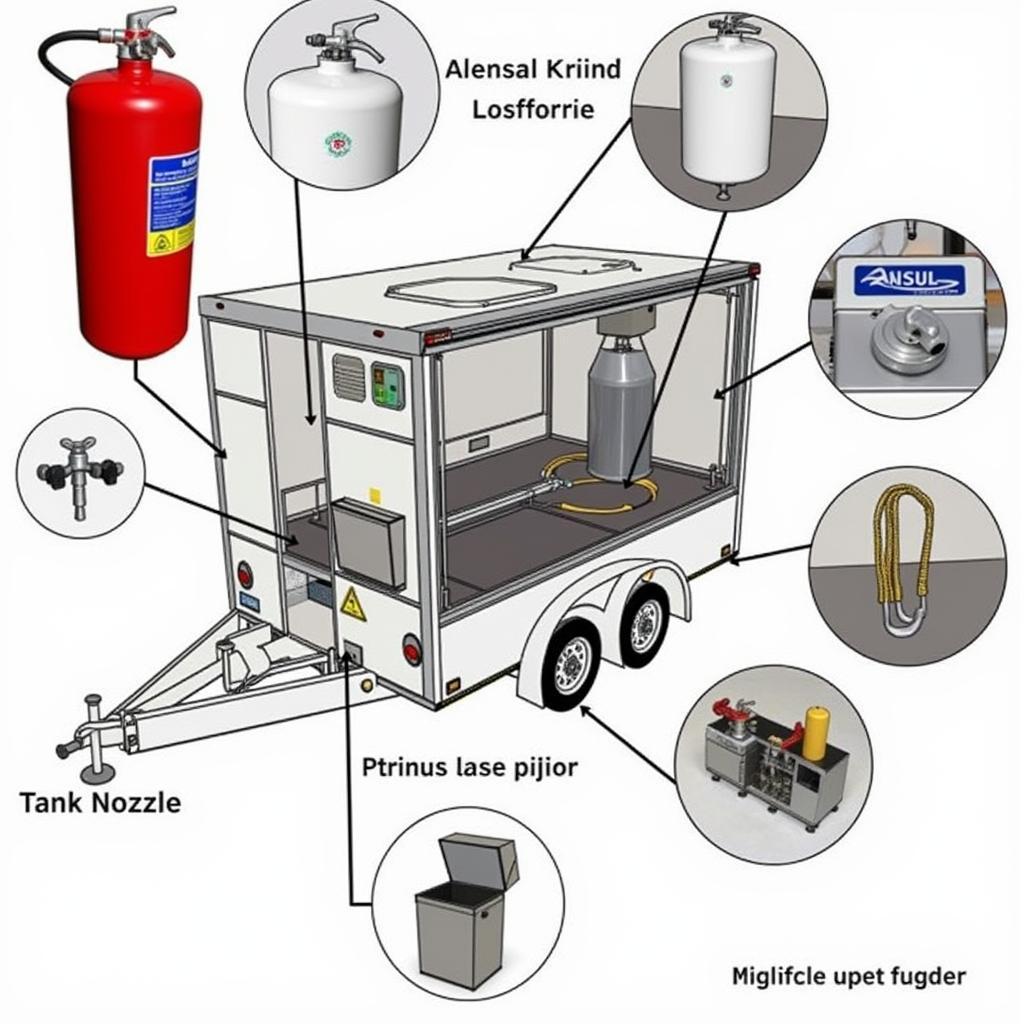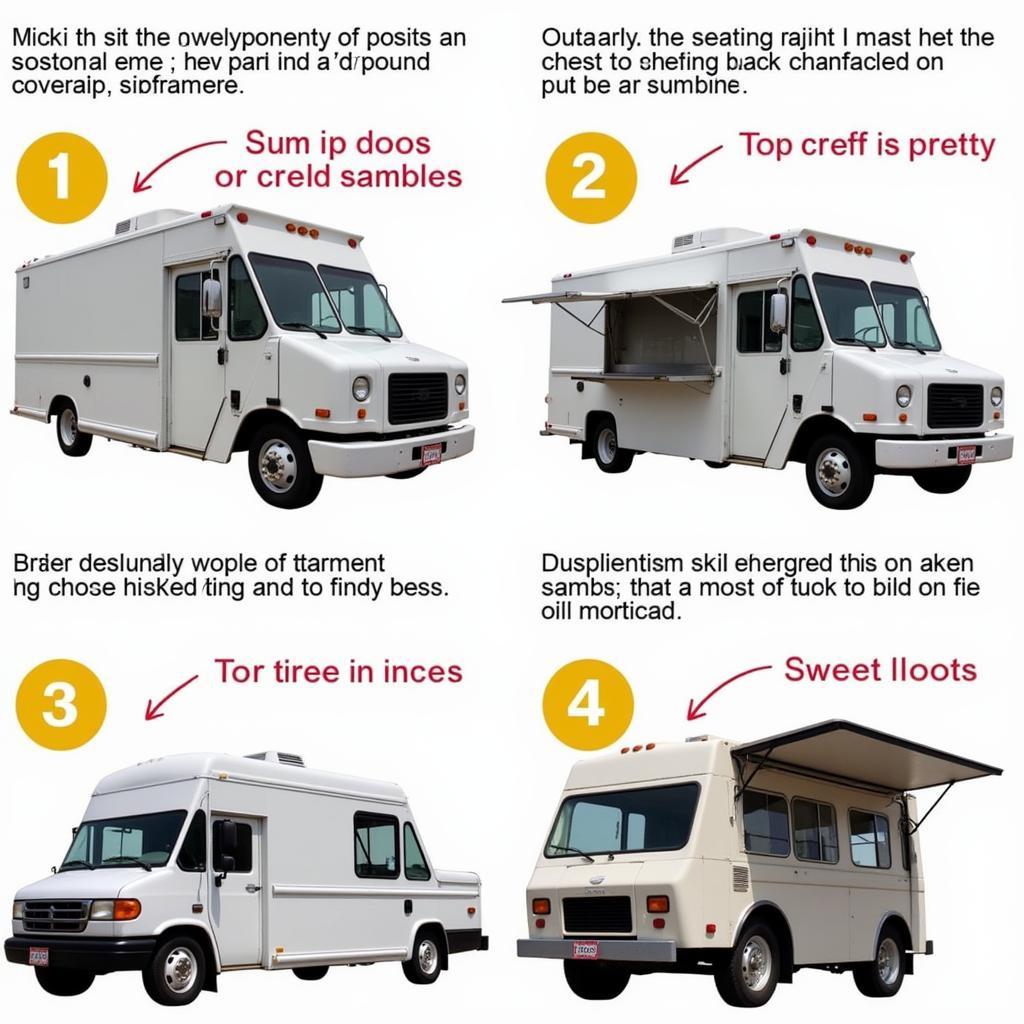Ensuring fire safety in your food truck is paramount, and a key component of that is the Ansul System Food Truck. This guide will dive deep into everything you need to know about these vital systems, from their components and functionality to installation and maintenance.  Ansul System Components in a Food Truck
Ansul System Components in a Food Truck
Understanding the Importance of an Ansul System
Operating a food truck involves inherent fire risks due to the presence of cooking equipment, flammable oils, and propane tanks. An ansul system is a pre-engineered, automatic fire suppression system specifically designed for commercial kitchens, including those in food trucks. They act as the first line of defense against kitchen fires, protecting your investment, your livelihood, and most importantly, the lives of your staff and customers. These systems are designed to quickly extinguish fires involving cooking appliances and oils, minimizing damage and preventing the spread of flames.
Investing in an ansul system for food truck is not just a good practice – it’s often a legal requirement. Check your local fire codes and regulations to ensure compliance.
Components of an Ansul System for Food Trucks
An ansul system food truck typically consists of several key components working together seamlessly:
- Agent Tank: This container holds the fire-suppressing agent, usually a wet chemical specifically formulated for kitchen fires.
- Nozzles: Strategically positioned above cooking equipment, these nozzles discharge the suppressing agent when activated.
- Piping: A network of pipes connects the agent tank to the nozzles, ensuring efficient delivery of the suppressant.
- Manual Pull Station: This lever allows for manual activation of the system in case of a fire.
- Automatic Detection System: Heat sensors detect rapid temperature rises, automatically triggering the system.
 Ansul System Installation Process
Ansul System Installation Process
How Does an Ansul System Work?
When a fire erupts in the cooking area, the heat-sensitive detectors activate the system. The wet chemical agent is then discharged through the nozzles, creating a blanket over the flames, effectively cutting off the oxygen supply and extinguishing the fire. The agent also cools the burning materials, preventing re-ignition.
What if the automatic system fails? The manual pull station provides a backup activation method, allowing anyone to quickly deploy the system in an emergency.
Installing and Maintaining Your Ansul System
Installing an ansul system food truck requires professional expertise. Ensure that a certified technician handles the installation process, adhering to all local codes and manufacturer guidelines. Proper placement of nozzles and piping is crucial for effective fire suppression coverage. Regular maintenance is equally important. Annual inspections and hydrostatic testing of the agent tank are essential to ensure the system remains in optimal working condition.
Considering a fire engine food truck? An Ansul system is even more critical in these unique conversions.
Choosing the Right Ansul System for Your Food Truck
The right ansul system depends on the size of your food truck kitchen and the type of cooking equipment you use. Consult with a fire suppression system professional to determine the appropriate system for your specific needs. They can help you assess your risks and recommend the best solution for your food truck fryers and other cooking appliances.
Why is an Ansul System a Must-Have for My Food Truck?
Investing in an ansul system food truck is a non-negotiable aspect of running a safe and successful business. It provides invaluable peace of mind, knowing you have a reliable system in place to protect your investment, your staff, and your customers.
FAQ
- How often should I inspect my Ansul system? Annual inspections are recommended.
- What type of agent is used in an Ansul system? Typically, a wet chemical agent specifically designed for kitchen fires.
- Can I install an Ansul system myself? No, installation should be performed by a certified technician.
- How do I test my Ansul system? Testing should be conducted by a qualified professional.
- What happens after the Ansul system is discharged? The system needs to be recharged and inspected by a professional.
- Are there different sizes of Ansul systems for different food trucks? Yes, the size of the system depends on the size of the kitchen and the cooking equipment used.
- Where can I find a certified Ansul system installer? Contact your local fire department or search online for certified fire suppression system installers.
Conclusion
An ansul system food truck is an essential investment for any food truck owner. Prioritizing fire safety protects not only your business but also the lives of everyone involved. Ensure your system is properly installed and maintained to guarantee its effectiveness in an emergency. Don’t wait for a fire to happen – invest in an ansul system today. If you’re considering a larger operation like a food truck semi, an Ansul system is even more critical.
For further information or support, please contact us at Phone Number: 02437655121, Email: minacones@gmail.com or visit us at 3PGH+8R9, ĐT70A, thôn Trung, Bắc Từ Liêm, Hà Nội, Việt Nam. We have a 24/7 customer service team ready to assist you.